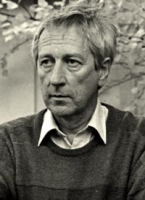| tuō mǎ sī · tè lán sī tè luó mò | |
| tuō mǎ sī · yuē sī tǎ · tè lán sī tè luó mò | |
| tuō mǎ sī · tè lǎng sī tè luó mǔ | |
| chūshēngdì: | sī dé gē 'ěr mó |
|
yuèdòutè lǎng sī tè luó mǔ Tomas Tranströmerzài诗海dezuòpǐn!!! | |
Tranströmer received his secondary education at the Södra Latin School in Stockholm and graduated as a psychologist from Stockholm University in 1956. He began writing at thirteen, and published his first collection of poems, 17 dikter (Seventeen Poems) in 1954. His latest collection, Den stora gåtan (The Great Enigma), was published in 2004, and an English translation of his entire body of work, The Great Enigma: New Collected Poems, was published in 2006. He published a short autobiography, Minnena ser mig (The memories are watching me), in 1993.
Other poets - especially in the "political" 70's - accused him for being apart from his tradition and not including political issues in his poems and novels. His work, though, lies within and further develops the Modernist and Expressionist/Surrealist language of 20th century poetry; his clear, seemingly simple pictures from everyday life and nature in particular reveals a mystic insight to the universal aspects of the human mind.
Tranströmer and the American poet Robert Bly are close friends and their correspondence has been published in the book Air Mail.
In 1990, he suffered a stroke that affects his speech, but he continues to write. He has often been mentioned as a candidate for the Nobel Prize in Literature, and many consider him one of Sweden's foremost poets. Tranströmer's awards include the Bonnier Award for Poetry, the Neustadt International Prize for Literature, the Oevralids Prize, the Petrach Prize in Germany, and the Swedish Award from International Poetry Forum. His poetry has been translated into fifty languages; Bly, Robin Fulton, and the prominent American blues writer Samuel Charters have translated his work into English.
In 2007, Tranströmer received a special Lifetime Recognition Award given by the trustees of the Griffin Trust for Excellence in Poetry, which also awards the annual Griffin Poetry Prize.
In addition to his work as a writer, Tranströmer was also a respected psychologist before he had his stroke. He worked in juvenile prisons, and with disabled, convicts, and drug addicts. He is also a good piano player, something he has been able to continue after his stroke, albeit with one hand.
Collected poems
17 dikter (1954) - Seventeen Poems
Hemligheter på vägen (1958)
Den halvfärdiga himlen (1962) - The Half-Finished Heaven
Klanger och spår (1966) - Windows and Stones
Mörkerseende (1970) - Night Vision
Stigar (1973) - Paths
Östersjöar (1974) - Baltics
Sanningsbarriären (1978)
Det vilda torget (1983)
För levande och döda (1989) - For the Living and the Dead
Sorgegondolen (1996)
Den stora gåtan (2004)
The Great Enigma: New Collected Poems (2006) - Translated by Robin Fulton
